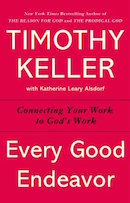Reclaiming Sabbath Keeping: More than Rest
Blog / Produced by The High Calling
I try to get out early, before my shadow begins to fold beneath me, before the sun becomes a harsh companion. I pull on a floppy hat, smother my skin with sunscreen, and dig my trowel out of the tool bin. It is Saturday, the day I practice Sabbath-keeping and I have been looking forward to this time to work in my flowers all week.
Does this sound incongruent? To say “work in my flowers” as a means of keeping Sabbath? What does it look like to keep the Christian Sabbath, anyway? We've been having a conversation about Sabbath-keeping here at The High Calling and it seems we've stirred up more questions than answers.
It's Personal
Walter Brueggemann, Professor Emeritus of Old Testament at Columbia Theological Seminary, prolific author, and Biblical scholar says that defining Sabbath is a personal process, one that each person or family must work out for themselves.
“I think that Sabbath means to be in a mode of receptivity for gifts to be given and that requires one to slow down, to pause, to wait...” Brueggemann says in a three part lecture on Sabbath filmed at a church in Cincinnati.
“As much as we can date texts in the Old-testament,” he says, “Sabbath did not become a defining Jewish practice until the exile … and if Sabbath is in exile, then what we know about the exile is that Jews had to be very intentional about maintaining their Jewish identity in an empire situation that wanted to destroy their peculiar identity. So I think what happens is … that sabbath becomes a visible performance of Jewish identity that contrasts the way Jews organize their time to the empire that was all around them and I want to suggest that as Christians piggyback on Jewish Sabbath that the keeping of Sabbath may be a visible demonstration of our baptismal identity.”
Watch this excellent series of Walter Brueggemann's lecture on Sabbath at The Englewood Review of Books.
Eugene Peterson underscores this idea that Sabbath-keeping is a personal practice in an interview with Q-ideas founder Gabe Lyons.
“Let me qualify this by saying that rhythm is very individual. You can't impose a rhythm on somebody; you have to enter into a rhythm. And people don't have to have the same rhythm. Some people can walk in three-quarter time and some in four-four time. You don't have to do it the same. You can't do it the same. You've got to find the rhythm of your own body, your own life, your own history. Having rhythm means that you live out who you are in relationship to who God is, who Jesus is. So it's more like a dance...”
Read more of the interview with Eugene Peterson here and find out what Sabbath looks like for this esteemed pastor and celebrated author of The Message.
A Way to Honor Work
In another interview from the 2012 New Life Conference, Eugene Peterson helps us understand how Sabbath and work are intertwined.
“ ... [W]e've got to understand the nature of Sabbath, which is paying attention to God's work. He worked six days, rested the seventh and then that seventh day, three times the word sabbath is used … if you're looking for some way to understand how important this is [Sabbath-keeping], Genesis one will do it for you if you just pay attention … it takes place in the context of a week of work … sabbath now becomes a way of understanding your week of work as God's work, not my work ...”
In a world consumed with productivity and the next big innovation, establishing a practice of regular rest may seem old-fashioned. But Sabbath-keepers know the restoration of the spirit that comes with setting aside time to turn our entire being toward God—to reflect on and give thanks for the work of the other six days of the week. Writer Glynn Young muses on Sabbath as disruption.
“[O]ur lives are so busy, so crammed, so scheduled that a change like observing the Sabbath would be a huge disruption...Perhaps that's the point,” he says.
Deeper than Following Rules
Even when we see the benefits of observing Sabbath, it seems to be our nature to fall back onto rules, to let our observance of Sabbath become bogged down in legalistic tendencies.
Pastor and author Mark Buchanan addresses our legalistic tendencies in Sabbath observance in this brief interview with Lorna Dueck.
“I'm not legalistic to the point where I'm going to make having to rest the new work …” Buchanan says.
In this Sunday reflection, Rev. Kirk Winslow discusses how the people of God often do this very thing.
"... In laboring to 'follow Jesus in everything' we had filled our lives with endless doing. The resulting exhaustion meant 'one more thing' was almost out of the question."
Writer Shelly Miller also helps us transcend these tendencies by dispelling three myths about Sabbath. Are you guilty of believing that rest is not achievable in today's culture? Do you think it means you're lazy if you deliberately set aside time for rest? Do you get so overwhelmed by following certain Sabbath rules that you've just given up? Miller has good words for you.
In her article “Sabbath Celebration”, Kimberlee Conway Ireton wrestles with the appropriateness of getting a pedicure on Holy Saturday. Eventually she comes to the realization that Sabbath is more than a cessation of work; it is gift. A gift we neither earn nor deserve.
… No work and a nap are probably a good start, but Sabbath is so much more. Sabbath is a way of being in the world on days other than Sunday. Sabbath is margin and gift and joy. Sabbath is soaking myself—or rather, letting myself be soaked—in the unmerited, unmeritable grace of God.
It's About Community
A group of artists founded The Sabbath Manifesto, an online creative project that supports those endeavoring to practice Sabbath. The community is based on ten core principles that are designed to help members carve out a weekly time to slow down and step out of the chaos of daily life. The project actively promotes The National Day of Unplugging as a means of stepping deeper into Sabbath-keeping. You can read more about that here. If you're interested in that, you might want to check out Shelly Miller's Sabbath Society--a group of over two hundred people who are committed to observing Sabbath faithfully.
*****
Sometimes God speaks loud like the roar of an engine or the booming of thunder and I’ve heard people tell stories about how this Big Voice changed everything for them in an instant. I’ve heard God speak, but not in this loud voice. Whenever He comes calling on me, it’s usually in the garden.
This is the place I leave the world behind. This is the way I turn my whole self toward God. This is the work that gives rest. Where do you find the Sabbath rest?
Some recommended reading on Sabbath-keeping:
- Sabbath as Resistance by Walter Brueggemann
- The Rest of God by Mark Buchanan
- Living the Sabbath by Norman Wirzba
- Mudhouse Sabbath by Lauren Winner
- The Sabbath by Abraham Joshua Heschel
- Keeping the Sabbath Wholly by Marva J. Dawn
- This Day: New and Collected Sabbath Poems 1979-2012 by Wendell Berry
_____________________________
Reclaiming Sabbath Keeping
Sabbath is more than a day off. It is a turning of the entire being toward God—a time set apart to contemplate life and work and praise the Creator for it all. The Christian observance of Sabbath is set apart by its lack of rules—there is no strict way to keep Sabbath in Christianity. It’s not a “must” of our faith. And yet, to ignore this fourth commandment is to miss some of God's richest blessings for his people. In this series on Reclaiming Sabbath Keeping we explore what the Christian Sabbath might look like and glimpse some benefits and challenges of Sabbath-keeping in today's productivity-driven culture. Join us in the conversation and invite others along by sharing these stories through email or your social media networks.
Featured image by Patrick. Used with permission. Sourced via Flickr.
Graphic by Jennifer Dukes Lee. Photo by Patricia Hunter.





